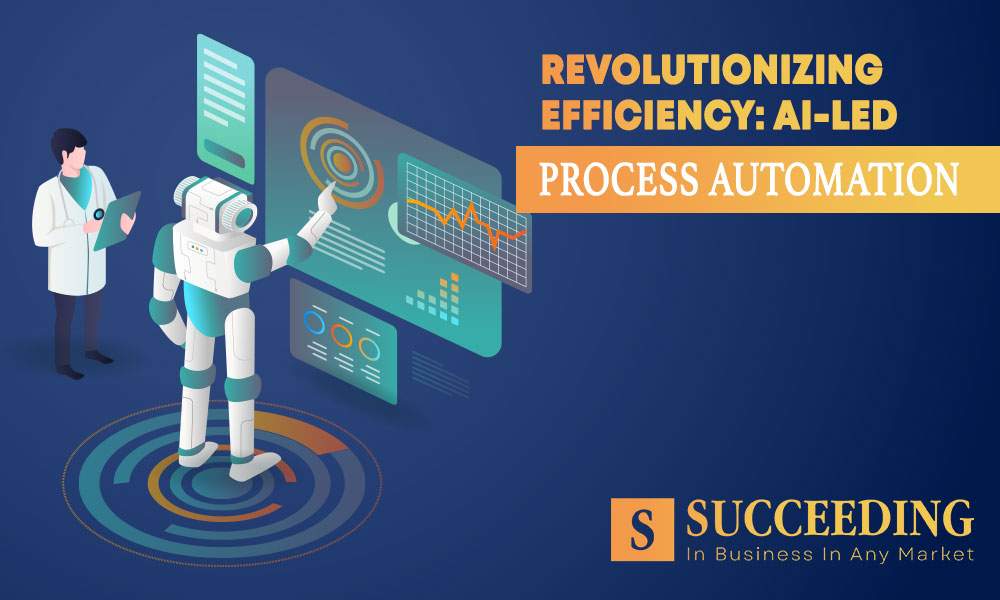Post Date: May 6, 2024

In the fast-paced world of business, the quest for efficiency is unending. Enter AI-led process automation, a transformative force reshaping traditional workflows and revolutionizing the way organizations operate. In this article, we delve into the core concepts of AI-led process automation, its key components, real-world applications, and the promising future it heralds for businesses seeking unparalleled efficiency gains.
1: Understanding AI-led Process Automation:
AI-led process automation represents the convergence of artificial intelligence and automation technologies. Unlike traditional automation, AI-led automation leverages advanced technologies such as machine learning and natural language processing to augment and optimize processes. This section provides a foundational understanding of how AI integrates with automation to drive efficiency to new heights.
2: Key Components of AI-led Process Automation:
At the heart of AI-led process automation are several core components. Machine learning algorithms enable systems to learn and adapt, robotic process automation (RPA) handles rule-based tasks, and cognitive automation mimics human thought processes. These components work in tandem to transform manual and repetitive tasks into streamlined, intelligent processes.
3: Benefits of AI-led Process Automation:
The benefits of AI-led process automation are manifold. Improved operational efficiency, reduced errors, and significant cost savings are just the tip of the iceberg. By automating routine tasks, organizations can reallocate human resources to more strategic activities, driving innovation and creating a competitive edge. This section explores the tangible advantages that businesses can gain from adopting AI-led process automation.
4: Real-world Applications:
AI-led process automation finds application across diverse industries, bringing about remarkable improvements in productivity and efficiency. Real-world examples abound, from automating customer support inquiries to optimizing supply chain management. Case studies illustrate how organizations have successfully implemented AI-led automation, showcasing measurable results and lessons learned.
5: Integration Challenges and Solutions:
While the benefits of AI-led process automation are clear, integration comes with its set of challenges. Common hurdles include data integration issues, employee resistance, and compatibility concerns. This section addresses these challenges head-on, providing practical solutions and strategies to ensure a smooth and effective integration process.
6: AI-led Process Automation in Specific Industries:
The versatility of AI-led process automation is evident in its ability to adapt to the unique needs of various industries. Whether in healthcare, finance, manufacturing, or other sectors, AI-led automation is tailored to enhance specific processes. Industry-specific examples demonstrate the versatility and widespread applicability of AI-led automation.
7: The Future Landscape of AI-led Process Automation:
Looking ahead, the future of AI-led process automation is teeming with possibilities. Emerging trends such as hyperautomation and the continuous evolution of AI technologies promise even greater advancements. This section explores the potential impact of these trends on the future landscape of business process automation.
8: Security and Ethical Considerations:
As AI-led process automation becomes integral to business operations, addressing security concerns and ethical considerations is paramount. This section emphasizes the importance of robust security measures and responsible AI use, ensuring data privacy and transparency in the deployment of AI technologies.
9: Implementing AI-led Process Automation:
For organizations considering AI-led process automation, a step-by-step guide is provided. This includes considerations for selecting the right technologies, comprehensive employee training, and strategies for a seamless transition. Practical insights aim to guide businesses through the implementation process.
10: Case Studies:
Real-world success stories serve as powerful illustrations of the transformative impact of AI-led process automation. Case studies highlight the challenges faced by organizations, the strategies employed, and the quantifiable improvements achieved, offering valuable insights for businesses embarking on their automation journey.

Conclusion:
In conclusion, AI-led process automation isn’t just a technological evolution; it’s a revolution. From enhancing efficiency to creating a more agile and innovative organizational culture, the benefits are substantial. Businesses that embrace this transformative technology position themselves for sustained success in an increasingly competitive landscape.
FAQs:
Q1: What is AI-led process automation, and how does it differ from traditional automation?
AI-led process automation represents the convergence of artificial intelligence and automation technologies. Unlike traditional automation, AI-led automation leverages advanced technologies such as machine learning and natural language processing to augment and optimize processes.
Q2: What are the core components of AI-led process automation?
The core components include machine learning algorithms, robotic process automation (RPA), and cognitive automation. These elements work together to transform manual and repetitive tasks into streamlined, intelligent processes.
Q3: What benefits can businesses expect from implementing AI-led process automation?
Businesses can expect improved operational efficiency, reduced errors, cost savings, and the strategic allocation of human resources. By automating routine tasks, organizations can drive innovation and create a competitive edge.
Q4: Can you provide real-world examples of AI-led process automation in action?
Certainly. Real-world examples range from automating customer support inquiries to optimizing supply chain management. Case studies illustrate how organizations have successfully implemented AI-led automation, showcasing measurable results.
Q5: What challenges might businesses face when integrating AI-led process automation, and how can they overcome them?
Common challenges include data integration issues, employee resistance, and compatibility concerns. Practical solutions and strategies are provided to ensure a smooth and effective integration process.
Q6: How is AI-led process automation tailored to specific industries, and can you provide examples?
AI-led process automation is versatile and adaptable to the unique needs of various industries. Industry-specific examples demonstrate how AI-led automation enhances processes in healthcare, finance, manufacturing, and other sectors.





